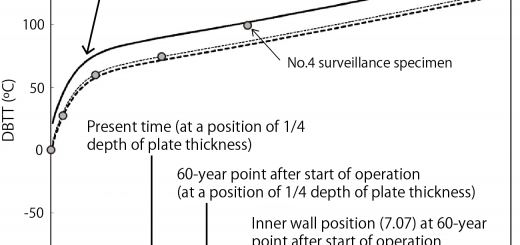News Watch
NRA Gives Go-ahead for Oceanic Release of Water Contaminated from the Fukushima Nuclear Accident
Japan’s Nuclear Regulation Authority (NRA) approved a draft judgement on May 19 validating the design of facilities for releasing into the ocean water containing tritium and other radionuclides, which has continued to accumulate due to the accident at Tokyo Electric Power Co.’s (TEPCO’s) Fukushima Daiichi Nuclear Power Station. It also endorsed the “execution plan,” which details the procedures. It is accepting public comments until June 17 and will give its official approval to the plan during July at the earliest.
TEPCO was expected to begin construction of facilities such as a sea-bed tunnel needed for oceanic release, once it could gain the prior understanding of local municipalities, but rather than wait for that, it commenced revised excavation work on May 5 in the name of “preparatory construction.” It will be installing a concrete structural caisson (a structure that keeps water out) where it is excavating, so the plan is to connect this to the sea-bed tunnel and have it serve as the discharge port.
Prime Minister Kishida and the Minister of Economy, Trade and Industry held talks with the head of the Fukushima Prefectural Federation of Fisheries Co-operative Associations on April 5th regarding the release of this contaminated water, assuring him once again that “no measures will be taken without the understanding of everyone involved,” but the fact remains that preparations for oceanic release continue moving steadily forward. In response, the Federation asserted once again that it remained “absolutely opposed” to the plan.
Quality Data Falsified in Japan Steel Works’ Products for Thermal Power Plants
Japan Steel Works Corp. (JSW) admitted on May 7 that its subsidiary, Japan Steel Works M&E (in Muroran City, Hokkaido), had been shipping to its customers rotor shafts for turbines and generators, and retaining rings for generators that did not meet the customer-requested quality standards. It owned up to falsifying the inspection results, saying this had been going on since 1998 at the latest. The fraud had been revealed by a whistleblower. The company explained that it seemed the problem had resulted from circumstances such as letting the divisions in charge of the products also handle quality-assurance functions.
JSW also says that there is a separate quality-assurance division for nuclear power plant (NPP) products and that it has confirmed that there are no problems with any of its individual products that are in use at operating NPPs. It has established a special investigative committee and says it will perform a separate investigation to determine the causes and all of the facts in the case and implement measures to prevent recurrences.
International Certification of Mitsubishi Electric’s Factory in Ako (Hyogo Prefecture) Rescinded due to Transformer Inspection Fraud
Mitsubishi Electric revealed on April 21 that an investigation on April 1 performed by a committee established after inspections of air conditioning units were found to have been faked in 2021, had discovered evidence of fraudulent testing of transformers. A total of 3,384 transformers purchased by each of Japan’s railway companies and the nuclear power and thermal power affiliates of each of Japan’s electric power companies over a period of about 40 years had been tested at voltages lower than the accepted standard in tests of their ability to withstand high voltages, but their documentation had been written to indicate they had undergone testing according to the standard.
The company announced on May 6 that its ISO9001 international standard and other certification guaranteeing its quality had been temporarily suspended.
Two Emergency Diesel Generator Failures in Eleven 24-hour Operation Tests
At an NRA meeting on May 18, a question from the Nuclear Regulation Agency, the NRA’s secretariat, regarding the results of the fiscal 2021 fourth quarter nuclear regulatory inspection revealed that there had been two emergency diesel generator failures in 11 24-hour test runs. NRA Chairman Fuketa Toyoshi had the following to say at the press conference after the meeting. “I won’t go as far as bringing up the Fukushima Daiichi Nuclear Power Station, but when external power sources fail, what we rely on first are the DGs, which we are supposed to be accustomed to using, and since there are two of them, this system has extremely high reliability. If there are two failures in 11 test runs, though, that is a whole different story. Thus I am starting to wonder what is really going on. Beyond that, as I said today, well, we confirmed that they could operate, but I think that in light of the example this time, we need to reexamine the reliability of equipment that could not be confirmed to work for long periods of time, and consider whether or not there hasn’t been any other oversights.”

